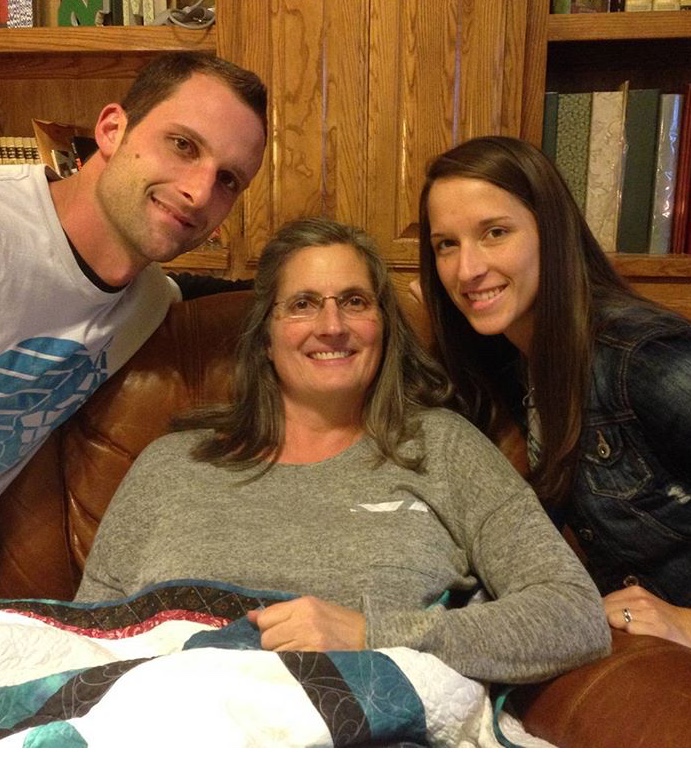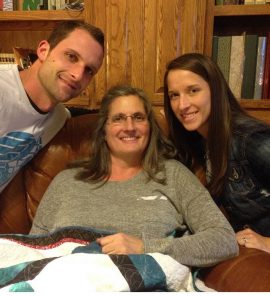Cancer: A Disease No One Deserves

Allisyn King remembers coming down the stairs into the kitchen at her parent’s house in Texas. Her mom, Margaret King, was standing in front of the stove with an apron on. She was making breakfast for her family the way she always did when they were together. Except her right hand was tucked firmly into the pocket of the apron and she was using one hand to do all the cooking.
The tumor on the left side of her brain was affecting her motor skills and speech.
Only the day before, King had a biopsy done on the tumor in her brain. The biopsy alone completely paralyzed the upper right side of her body. Margaret’s hand was tucked into her apron to keep it from swinging everywhere and knocking unwanted items into her cooking. She had no control over her right arm anymore.
A sickness that has taken over millions of lives and affected billions of others, should be eradicated.
According to the Texas Department of State Health services, in 2017, an estimated 120,173 new cancer cases will be diagnosed in Texas, and 44,523 Texans will die from cancer. Thousands of people in the state alone will suffer from the effects of cancer. Yet, Texas is still considered to be one of the lowest ranking cancer affected states.
Cancer is a word everyone knows, but no one deserves the pain associated with it. Not only does it affect the person who has it, but it also affects everyone around them.
Margaret King died 2 years ago from that brain tumor. “There are nightmares in my mind. Seeing her cry out in pain because she was hurting so bad,” Allisyn King, Margaret’s daughter said. “You can’t do anything about it. You want to fix it, but you can’t. You just have to watch her suffer.” Allisyn said seeing her mom in pain was absolutely the worst thing she had ever been through.
The cancer which caused King’s tumor is known as glioblastoma. This is a fast growing tumor that offers little to no relief. Glioblastoma is a rare form of cancer and as Margaret and her family would soon find out, there is no cure.
According to the Genetic and Rare Diseases Information Center, there is zero explanation of why this tumor suddenly forms. Because of the tumors spontaneity, doctors are unable to properly evaluate the disease to provide a proper treatment for it. Knowing this left the King family at a loss which is even more devastating than the cancer itself.
“The doctors didn’t know what happened. There was no reason for it,” Allisyn said. “They couldn’t pinpoint it and they didn’t know what triggered it.” Allisyn said she remembers thinking, “why couldn’t her mother have gotten some other form of cancer that was more treatable? Why did it have to be this?”
Kings tumor was already stage 4 when she was diagnosed. Doctors were saying that she had 18 months to 3 years to live. It had been only 11 months before the tumor completely took over Margaret’s brain.
“Now, I think about how awesome it would have been to get those 18 months with her,” Allisyn said.
According to the American Cancer Society, in 2015 cancer death for both men and women combined had fallen 26% from its peak in 1991. That is nearly 2.4 million deaths by cancer that have been averted. However, cancer diagnostics are increasing.
The National Cancer Institute reported, “from 2012 to 2030 worldwide cancer cases are projected to increase by 50% from 14 million, to 21 million.” Furthermore, “39% of both men and women will be diagnosed with cancer at some point in their lives.”
In 2018 alone, there is expected to be over 1.7 million diagnoses.
Jolinda remembers the night her husband James Easley died,“I would stay all day at the hospital. It was around midnight when I had gotten home. James died that night, on his daughter’s birthday.”
“Doctors don’t know how he got it,” Jolinda said as she began to tell the story of how they found out Easley

had cancer. “It started as a little ulcer. He never had one symptom, and never missed a day of work in his life.”
Jolinda went on to say around February of 1990 James made a trip to the emergency room because of some back pain he was having.
The doctor thought that James exhibited symptoms of kidney stones and he was treated as such, but they could never find them. Over the course of several weeks James rapidly lost about 25 pounds.
Finally, Jolinda had enough. She pulled James’s doctor aside and insisted he was missing something in his diagnosis.
Sure enough, the doctor took James in for a scan and found a mass hiding in his abdomen. It was stomach cancer. Specifically, adenocarcinoma. The tumor had grown through his stomach like roots of a tree and they were surrounding his organs. After the doctors finally took the x-ray, Jolinda grabbed it for herself. Even though she had no idea how to read an x-ray, she knew just by the oddity of what it looked like that something wasn’t right.
“It was in his bones. There were no symptoms of anything until it was too late. I knew that there was no cure,” Jolinda said.
Only 2 months after James’s diagnosis he would die.
“There is nothing as devastating as watching someone deteriorate,” Jolinda said. She said after the journey she went through with her husband, any time one of her kids would have an ache or pain of some sort she always took them to the doctor.
Her husband’s cancer surfaced so quickly, she was afraid that her children would also get cancer.
“I had a huge fear of it. I lost my mom and my husband,” Jolinda said. “Even when you think you will never be happy, you will be. You will smile again and you will live again.”
Cancer drives healthy families into isolation and depression. While there may not be a cure for cancer, there are plenty of people who have experienced many of the same things. However, each experience can be completely different when dealing with cancer.
“I miss my mom every moment. I miss her whole person. I miss not being able to talk to her, and I hate that she isn’t here to see her granddaughter,” King’s daughter said.
Her advice to those who have family members living with cancer is to live each moment fully.
“There is just so much that happens emotionally that I don’t even know what to say,” Allisyn said. “Spend as much time as you possibly can with them.”
Allisyn says that she is surprised at how many people have gone through the same thing.
She lowered her voice and hung her head. “I want her to know that I want to be the same hell of a mom that she was to me. Also, I am raising her granddaughter with everything she taught me.”
Losing someone is never easy. Especially when there is no hope of helping the person you love. Getting over the despairing loss will always be difficult.
Two years have passed since the brain tumor took the life of Allisyns mother. Yet, she still has not opened the letter her mother wrote to her right before the cancer claimed her.